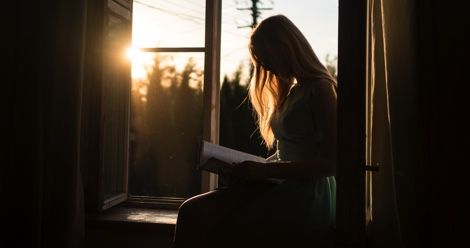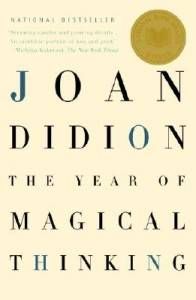
What Rereading THE YEAR OF MAGICAL THINKING Taught Me About Grief and Love
The first time I tried getting into Joan Didion I was 17.

Or, as Didion herself puts it: “You sit down to dinner and life as you know it ends.”
Even as a teenager I lived in fear of the moments when “life as you know it ends.” I counted exits in crowded rooms and imagined malicious shadows on my bedroom walls at night. I acted like the tragedies had already happened. This way, I reasoned, they couldn’t catch me off guard. Maybe The Year of Magical Thinking would give me the tools I needed to prepare for life’s harrowing eventualities.
I remember draping myself across the tan couch in our living room, air conditioner blasting the sticky July heat from my skin as I held the turquoise and cream softcover open in my lap, urging myself to feel serious and literary. But I was just bored. Didion’s writing style was far more sparse, less descriptive than that of the authors I adored as a teenager. I never thought reading about such profound heartache could leave me feeling so uninspired. I tried imagining myself in Didion’s shoes and substituted John for various family members and friends, imaginary love interests. This isn’t how I’d write about grief, I couldn’t help thinking. Not at all. I put the book on a shelf in my bedroom and forgot about it.
The Year of Magical Thinking came back to me ten years later on another summer day hot and thick as taffy. It sat on a crowded shelf in a used bookstore on Cape Cod, the price etched onto the title page in pencil: $9. My husband and I had been working our way through Didion’s catalog for the past few months. Sometime between Slouching Toward Bethlehem and The White Album I started to regret giving my copy of The Year of Magical Thinking during a particularly ruthless book purge. I paid the $9.
The Year of Magical Thinking was an entirely different book the second time around. I now saw Didion’s straightforward descriptions and repeated mantras as poignant, not dull. I no longer regarded her simplicity as a missed opportunity. Instead, I thought yes, this is how it is. I’d experienced real loss in the decade since I’d read the book last, and real romantic love. My grandmother died and I got married, all in the same year. Didion’s sadness-tinged words about death and commitment rang true for me in a way they hadn’t before.
Grief, like marriage, isn’t always dramatic. The smallest things remind me of my grandma: fried eggplant, certain smells and words, a particular shade of deep red. The smallest things remind me of my husband: blonde hair, green street signs, that precise fall temperature that’s an equal mix of warm and cool air. This is what Didion captures so beautifully in The Year of Magical Thinking, and what I didn’t understand at 17—how a life accumulates in the small details.
I don’t believe you need firsthand experience to get a book. Plenty of my favorite novels and memoirs bear no resemblance to my life. But I will always be a rereader. Nothing reflects the gulf between who you were and who you are like art. When I was 17 I thought myself mature enough, old enough, ready enough for The Year of Magical Thinking. “Joan Didion” was a name on the Serious Literature Checklist and I chose that book in particular almost as a challenge to myself—read this and prove that you are ready to be an adult. And maybe boredom while reading was the price you paid for reading like a grownup.
But when I returned to the book again, a decade older and hopefully a little wiser, I saw everything I missed the first time.














